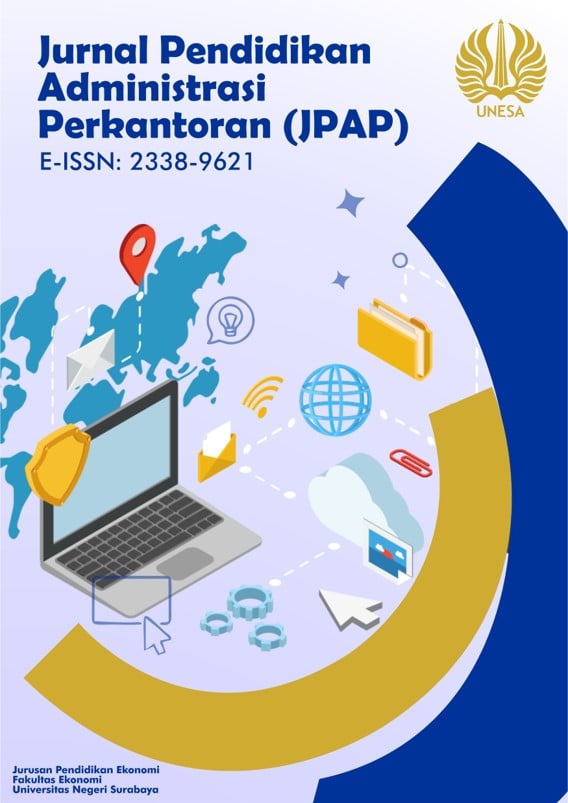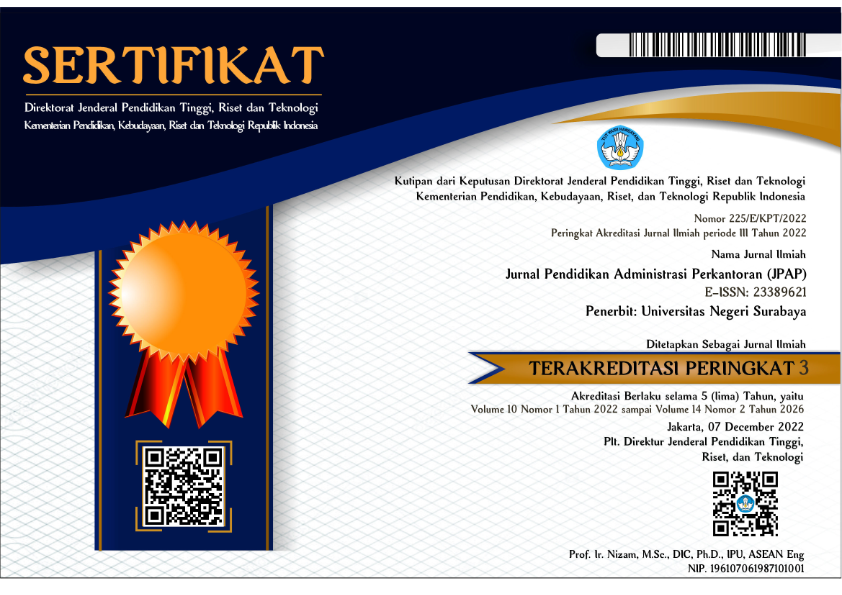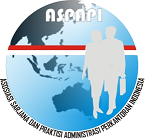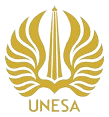Pengaruh Model Pembelajaran Kooperatif Tipe Group Investigation Pada Mata Pelajaran Otomatisasi Tata Kelola Kepegawaian Terhadap Kemampuan Berpikir Kritis dan Hasil Belajar Siswa
DOI:
https://doi.org/10.26740/jpap.v8n2.p329-339Keywords:
Critical Thinking, GI, Learning OutcomesAbstract
This study aims to determine the effect of cooperative learning models type group investigation on critical thinking ability and student learning outcomes in class XI OTKP SMK Negeri 2 Tuban. Type of experimental reseach with quasi experimental design. The reseach sample is class XI OTKP 1 dan 2. Data collection methods using tests, documentation, interview and observation. Research instrument used in the cognitive and psychomotor domain. Data analisis use homogeneity test, normality test, gain score test, and hypothesis test. The ability to think critically in the hypothesis test gets the result of tvalue > ttable (5,585>1,994) the significance level is 0,000<0,05. The hypothesis test result of learning outcomes show value tvalue > ttable (4,493>1,994) significance level is 0,000 < 0,05. T-test gain score analysis obtained the results of tvalue > ttable (5,750>1,994) significance level is 0,000<0,05. Based on these results it can be interpreted that H1 ia accepted. Can be concluded that the cooperative learning model type group investigation influences critical thinking ability and student learning outcomes.
References
Christina, L. V., & Kristin, F. (2016). Efektivitas Model Pemeljaran Tipe Group Investigation dan Cooperative Integrated Reading And Composition (CIRC) Dalam Meningkatkan Kreativitas Berpikir Kritis Dan Hasil Belajar IPS Siswa Kelas 4. Scholaria¯: Jurnal Pendidikan dan Kebudayaan, 6(3), 217230.
Darmawan, I. P. A., & Sujoko, E. (2013). Revisi Taksonomi Pembelajaran Benyamin S. Bloom. Satya Widya, 29(1), 3039.
Dewi, R. P., Iswari, R. S., & Susanti, R. (2012). Penerapan Model Group Investigation Terhadap Hasil Belajar Materi Bahan Kimia Di SMP. Unnes Science Education Journal, 1(2), 6976.
Fisher, A. (2009). Berpikir Kritis¯: Sebuah Pengantar. Jakarta: Eirlangga.
Hamdani. (2011). Strategi Belajar Mengajar. Bandung: CV Pustaka Setia.
Johnson, E. B. (2014). Contextual teaching and Learning Menjadikan Kegiatan Belajar-Mengajar Mengasyikan dan Bermakna. Bandung: Kaifa.
Matroji. (2016). Penerapan Model Group Investigation Untuk Meningkatkan Hasil Belajar Siswa Dalam Pembelajaran Sejarah Materi Pengaruh Sejarah Dunia Terhadap Sejarah Bangsa Indonesia Abad 18-20. Pedagogia, 14(2), 356362.
Mushoddik, Utaya, S., & Budijanto. (2016). Pengaruh Model Pembelaaran Group Investigation Terhadap Kemampuan Berpikir Kritis Siswa MAN 6 Jakarta. Geo Edukasi, 5(2), 110.
Purwanto. (2011). Evaluasi Hasil Belajar. Yogyakarta: Pustaka Pelajar.
Rahmawati, D., & Sutarto, H. (2014). Implementasi Group Investigation Dengan Scientific Approach Berbasis Portofolio Terhadap Kemampuan Berpikir Kritis Matematis. Unnes Journal of Mathematics Education, 3(3), 220230.
Rahmawati, E. D. (2012). Penerapan Model Pembelajaran Kooperatif Tipe Group Investigation (GI) Untuk Meningkatkan Keaktifan Belajar dan Hasil Belajar Mata Pelajaran Sosiologi pada Siswa Kelas X 3 SMA Negeri Colomadu Tahun Pelajaran 2011/2012. Jurnal sosialitas, 2(1), 195200.
Rosy, B., & Triesninda Pahlevi. (2015). Penerapan Problem Based Learning Untuk Meningkatkan Kemampuan Berpikir Kritis dan Keterampilan Memecahkan Masalah. Prosiding Seminar Nasional Pendidikan Ekonomi œPrefesionalisme pendidik dalam Dinamika Kurikulum Pendidikan di Indonesia pada Era MEA. Proseding Seminar Nasional, 160175. Universitas Negeri Yogyakarta, Yogyakarta.
Siddiqui, M. H. (2013). Group Investigation Model of Teaching¯:Enhancing Learning Level. Paripex - Indian Journal Of Research, 3(4), 7880.
Sudjana, N. (2014). Penilaian Hasil Proses Belajar Mengajar. Bandung: PT Remaja Rosdakarya.
Sugiono. (2016). Metode Penelitian Pendidikan. Bandung: Alvabeta.
Suprijono, A. (2012). Cooperative Learning. Yogyakarta: Pustaka Pelajar.
 Abstract views: 624
,
Abstract views: 624
, PDF Downloads: 655
PDF Downloads: 655










